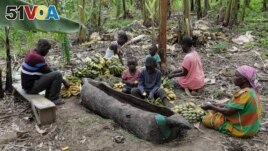Lawmakers in Uganda are considering barring people from making a popular alcoholic drink at home.
The bill being considered would affect people like the Ndyanabo family.
At least once a week, Girino Ndyanabo's family gathers around a hole in the ground where bananas have been left to ripen. The family then peels the bananas and puts them into a wooden container shaped like a boat. The father steps in with his bare feet. The sweet banana juice he presses out is then filtered. To this he adds sorghum. The juice is then left to ferment for up to a day. This process changes the juice into an alcoholic drink.

The Ndyanabo family peels bananas used for Tonto and throws them into a wooden vat carved like a boat in Mbarara, Uganda, Dec. 11, 2023. (AP Photo/Hajarah Nalwadda)
The result is the home-brewed drink Ugandans call tonto, or tontomera. This word describes a drinker's poor movements.
Tonto is famous in Uganda. Everyone drinks it – from officials to laborers. Singers sing about it. Politicians seeking office drink it with voters. And traditional ceremonies end at sunset with tonto parties.
However, there are threats to the way tonto is currently produced. More people are now drinking low-cost bottled beer. Health officials want rules to limit the risks from contaminated home brews. And officials want to get tax income from the production and sale of the drink.
The bill in the national assembly seeks to set rules for the production and sale of alcohol. It would make the activities of home brewers of tonto a crime. It would also make the production of other traditional home brews in the East African country a crime.
But farmers have a more urgent concern: Not enough new banana juice cultivars are being planted to produce the drink.
Instead, more farmers are planting a different sort of banana. This kind is boiled and eaten as a popular dish called matooke.
Girino Ndyanabo farms in the western district of Mbarara. His first experience with tonto was as a little boy in the 1970s. He said he has only a few plants left of the cultivars he uses to make tonto.
He gets his bananas from farmers near him until he can fill the small pit on his farm. The natural underground heat ripens the bananas within days as he prepares for the weekly pressing. The event is important in the family's daily life because they sell tonto.
Ndyanabo said his weekly brew has regular buyers. But in recent years, he has seen both demand and supply slow. This is partly because the sale price of tonto has been largely unchanged for many years.
However, the process of brewing it has become more difficult. Tonto brewers must travel farther for their bananas. Also, the price of sorghum has gone up.
"You take a lot of time doing this work. It's not as easy as someone who cuts matooke, puts it on a bicycle and sells it for cash immediately," Ndyanabo said of the green bananas that are eaten raw by most Ugandans. The bananas used for alcohol come from very far, he added.
To help this situation, he has been trying to plant more of the banana juice cultivars. They grow faster. And his son, Mathias Kamukama, helps.
The family makes five or six 20-liter jerricans for each brewing. A jerrican's worth sells for about $8. A half-liter of tonto sells for about 27 cents, compared to 67 cents for the cheapest bottled beer.
Benson Muhereza is an electrician who regularly visits a small drinking place in a poor neighborhood of Mbarara.
"It (is) like a favorite drink when you have your lunch. It (is) like a juice. When you don't want to take beer, you come and have your tonto," Muhereza said.
He said it does not make him feel bad or cause his head to hurt.
Christine Kyomuhangi sells tonto. She said she receives two jerricans of the brew every day. She knows her business is at risk because of the bill. But she smiled, saying buyers come from all over the city.
"Tonto will never get finished," she added, meaning tonto will survive all of these challenges.
I'm Anna Matteo.
Rodney Muhumuza reported this story for the Associated Press. Anna Matteo adapted this story for VOA Learning English.
___________________________________________
Words in This Story
ripen –v. when a fruit becomes ready to eat
filter –v. to take solid things out of a liquid using a filter
peel –v. to remove the skin from a fruit or vegetable
ferment –v. to process certain foods such as fruit or grains so that yeast breaks down the starch in the plant to make alcohol; to change the quality of a food by adding bacteria
brew –v. to add microorganisms to food to change its nature and preserve it for a future time
contaminated –adj. containing something that should not be there
cultivar - n a sort of plant that is one of several versions of closely related plants which gardeners or farmers grow
jerrican –n. a kind of container that has flat sides and is usually used to carry liquids
